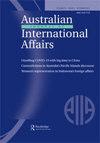60岁的南极条约体系:适合未来吗?
IF 1.8
3区 社会学
Q2 INTERNATIONAL RELATIONS
引用次数: 2
摘要
六十年来,《南极条约体系》成功地使南极大陆免于军事冲突,同时促进了国际科学合作和环境保护。今天,随着亚洲的崛起、大国政治的全球复苏、国际流行病和全球气候危机的加剧,国际体系再次经历深刻变化,似乎有必要探讨这一成功的多边体制可能受到的影响。面对如此系统性的国际挑战,如何解释ATS的持续成功?未来的多极世界秩序或自由民主全球秩序的危机,对地球上最脆弱的环境系统之一的这种精心平衡的治理安排意味着什么?崛起的中国和复兴的俄罗斯之间的关系,两者都有南极利益和在ATS中的合法和重要利益,而美国陷入了两极分化的国内政治,但拥有同样的ATS权利,毫无疑问将影响ATS和地球上最南端的大陆。老牌南极国家对新参与者的意图感到紧张,尤其是来自亚洲的新参与者,而快速发展的环境变化和新的监管挑战,如旅游业和生物勘探,都给ATS带来了额外的压力。在日益焦虑、争夺和竞争的国际环境中寻求共识和维持现状将是困难的。而拥有最大股份(声称拥有南极大陆42%的土地)的澳大利亚有着特殊的利益。似乎有必要在《澳大利亚国际事务杂志》(Australian Journal of International Affairs)上出一期特刊,提供澳大利亚和新西兰的南极学者对南极洲和南极研究中心未来的一些看法。ATS是否适合这种更具战略竞争性的国际环境?如果不适合,我们可以而且应该做些什么?澳大利亚可以在哪里领导这一努力?在第一篇文章中,伊丽莎白·布坎南考察了南极洲战略竞争的特点。布坎南认为,灰色地带活动是当代南极地缘政治的一个突出(但被忽视)特征。灰色地带战略允许各国在合作的幌子下促进自己的战略议程,但这些活动仍然遵守ATS,正如布坎南所说,在许多方面,该系统开启了灰色地带活动。自2000年以来,她对澳大利亚国防和外交政策部门的南极政策进行了深入分析。布坎南发现,澳大利亚的政策忽视了灰色地带的活动,未能把握住本文章由计算机程序翻译,如有差异,请以英文原文为准。
Antarctic Treaty System at 60: fit for the future?
For six decades the Antarctic Treaty System (ATS) has succeeded in keeping the Antarctic continent free from military conflict while facilitating international scientific cooperation and environmental protection. As the international system undergoes profound changes once again today with the rise of Asia, a global resurgence of great power politics, an international pandemic, and an accelerating global climate crisis, it seems warranted to explore how this successful multilateral regime might be impacted. In the face of such systemic international challenges, what explains the continued success of the ATS? What does a future multipolar world order or a crisis of liberal democratic global order mean for this carefully balanced governance arrangement of one of the most fragile environmental systems on the planet? The relationships between a rising China and resurgent Russia, both with Antarctic interests and legitimate and important stakes in the ATS, and a United States of America engulfed in polarised domestic politics, yet holding the same set of ATS rights, will no doubt affect the ATS and the Earth’s Southernmost continent. Established Antarctic nations are nervous about the intentions of new players, particularly from Asia, while rapidly progressing environmental change and new regulatory challenges such as tourism and bioprospecting all place additional pressure on the ATS. Finding consensus and maintaining the status-quo in an increasingly anxious, contested and competitive international environment will be difficult. And Australia, which has the largest stake (claiming 42% of the Antarctic continent), has a particular interest. It seems fitting to produce a special issue of the Australian Journal of International Affairs to offer just some of the ways in which Antarctic scholars in Australia and New Zealand perceive the future of Antarctica and the ATS. Is the ATS fit for this more strategically competitive international environment and if not, what could and should be done about it? Where can Australia lead this effort? In the first article, Elizabeth Buchanan examines the character of strategic competition in Antarctica. Buchanan argues grey zone activities are a prominent (yet overlooked) feature of contemporary Antarctic geopolitics. Grey zone strategies have allowed states to facilitate their own strategic agendas under the guise of cooperation and yet such activities remain in adherence to the ATS, in many ways as Buchanan argues, the system turns on grey zone activity. She undertakes an in-depth analysis of Australian Antarctic policy settings across the defence and foreign policy sectors since 2000. Buchanan finds Australian policy overlooks grey zone activities and fails to grasp the
求助全文
通过发布文献求助,成功后即可免费获取论文全文。
去求助
来源期刊

Australian Journal of International Affairs
INTERNATIONAL RELATIONS-
CiteScore
3.20
自引率
13.30%
发文量
44
期刊介绍:
AJIA is the journal of the Australian Institute of International Affairs. The Institute was established in 1933 as an independent and non-political body and its purpose is to stimulate interest in and understanding of international affairs among its members and the general public. The aim of the Australian Journal of International Affairs is to publish high quality scholarly research on international political, social, economic and legal issues, especially (but not exclusively) within the Asia-Pacific region. The journal publishes research articles, refereed review essays and commentary and provocation pieces. ''Articles'' are traditional scholarly articles. ‘Review essays’ use newly published books as the basis to thematically examine current events in International Relations. The journal also publishes commentaries and provocations which are high quality and engaging pieces of commentary, opinion and provocation in a variety of styles. The Australian Journal of International Affairs aims to analyse international issues for an Australian readership and to present Australian perspectives to readers in other countries. While seeking to stimulate interest in and understanding of international affairs, the journal does not seek to promote any particular policies or approaches. All suitable manuscripts submitted are sent to two referees in a full ''double blind'' refereeing process.
 求助内容:
求助内容: 应助结果提醒方式:
应助结果提醒方式:


